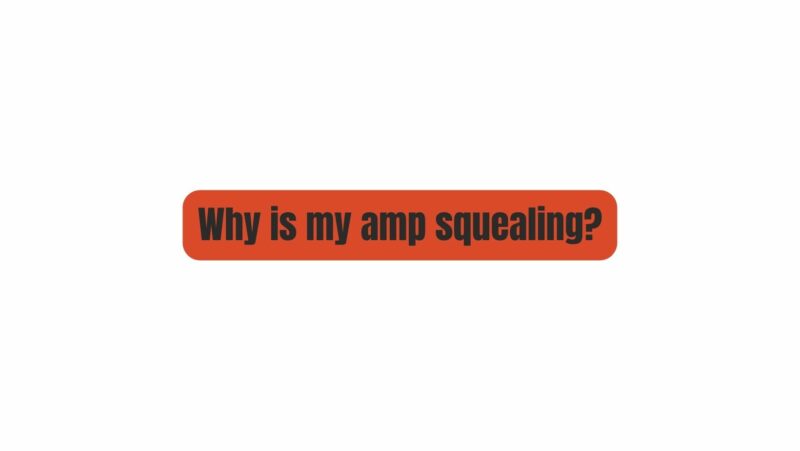Amplifiers are the lifeblood of our auditory experiences, delivering music, speeches, and soundscapes with precision. However, within the realm of sonic excellence, an unexpected intruder sometimes emerges – a persistent squealing noise. This high-pitched, piercing sound can be both disconcerting and disruptive. In this article, we embark on a journey to understand the causes of squealing noises in amplifiers, explore effective solutions, and discuss preventative measures. By demystifying the squeal, you can ensure your audio journey remains uninterrupted and enjoyable.
Understanding the Basics: How Amplifiers Work:
Before we dive into the reasons behind squealing noises in amplifiers, let’s establish a foundational understanding of how these audio devices function:
- Amplification Process: Amplifiers take low-level audio signals and magnify them to a level that can drive speakers or headphones, producing audible sound.
- Components of an Amplifier: A typical amplifier consists of preamplification stages, power amplification stages, and a power supply. Each component plays a specific role in the amplification process.
- Signal Path: An audio signal flows through the amplifier, undergoing various stages of amplification and processing before reaching the output stage, which ultimately drives the speakers or headphones.
The Enigmatic Squealing Noise: Common Causes:
Squealing noises in amplifiers can disrupt your audio journey. Let’s explore some common sources of these enigmatic sounds:
- Feedback Loops: Squealing noises can occur due to feedback loops within the amplifier’s circuitry. These loops can be introduced by improper connections, component failures, or circuit design issues, leading to a persistent squeal.
- Electromagnetic Interference (EMI): EMI can infiltrate the amplifier through unshielded cables or poorly insulated components. This interference often manifests as a squealing noise, especially when the amplifier is near electronic devices or fluorescent lights.
- Microphonic Tubes: In tube amplifiers, vacuum tubes can act as microphones, picking up mechanical vibrations and translating them into audible noise. A microphonic tube may produce or exacerbate a squealing sound.
- Grounding Issues: Poor grounding can contribute to amplifier noise, including squealing sounds. Ground loops, in particular, are a common cause of these issues, introducing unwanted noise into the audio system.
Addressing Squealing Noise: Solutions and Best Practices:
Now that we’ve identified potential causes of squealing noises, let’s explore strategies and best practices to address and prevent them:
- Feedback Loop Mitigation: Investigate the amplifier’s circuitry and connections for signs of feedback loops. Ensure that all components are properly connected and functioning as intended. Consult an experienced technician or amplifier specialist if necessary.
- High-Quality Cables: Invest in high-quality, shielded audio cables for your amplifier setup. Shielded cables help minimize EMI interference and ensure a clean signal path.
- Microphonic Tube Replacement: In tube amplifiers, gently tap each tube with a non-metallic object while the amplifier is on. If tapping a specific tube produces or exacerbates the squealing noise, that tube may be microphonic and in need of replacement.
- Grounding Optimization: Properly ground your amplifier to a clean, unpainted metal surface. Avoid grounding it to multiple points or using existing grounding that may introduce noise.
- Power Conditioning: Use a power conditioner or surge protector with EMI filtering to filter out electrical noise and provide clean, stable power to your amplifier.
- Noise Gates: Consider using a noise gate pedal or a built-in noise gate feature in your amplifier or audio processor. These devices can help suppress unwanted noise when you’re not actively playing.
- Professional Assistance: If the squealing noise persists or if you’re uncomfortable with DIY troubleshooting, seek the expertise of a qualified audio technician or amplifier specialist.
Preventative Measures: Keeping Squealing Sounds at Bay:
Preventing squealing noises in amplifiers is often more effective than addressing them after they occur. Here are some preventative measures to consider:
- Regular Maintenance: Implement a routine maintenance schedule for your amplifier. Periodically inspect and clean components, check connections, and ensure proper grounding to prevent potential sources of squealing noise.
- Quality Components: Invest in a high-quality amplifier with reliable components and a robust design. Quality amplifiers are less prone to developing squealing issues.
- Optimal Placement: Position your amplifier in a location free from electromagnetic interference sources and away from other electronic devices that may introduce EMI.
- Adequate Ventilation: Ensure that your amplifier has adequate ventilation to prevent overheating, which can lead to component failure and potential squealing noise.
- Proper Grounding: Follow best practices for proper grounding of your entire audio system, including amplifiers and connected equipment, to minimize the risk of ground loops and associated noise.
Conclusion: A Quieter Audio Journey:
Squealing noises in amplifiers may momentarily disrupt your audio experience, but with an understanding of their causes and the application of preventative measures, you can enjoy uninterrupted and satisfying sound quality. Whether it’s addressing feedback, optimizing grounding, or employing noise suppression devices, the key lies in proactive management and a commitment to maintaining your audio equipment. Embrace the challenge of silencing the squeal, and let your amplifier once again be the conduit for the captivating melodies and immersive soundscapes that enrich your life.


